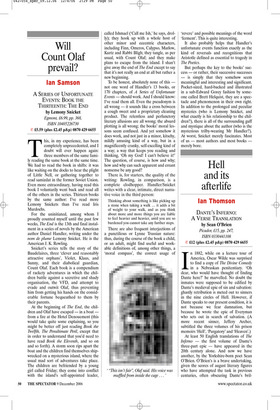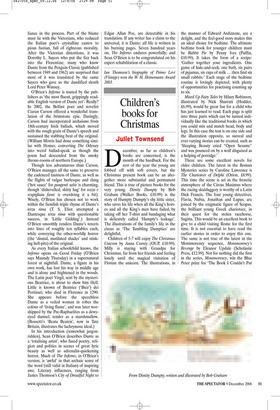Hell and its afterlife
Ian Thomson
DANTE’S INFERNO: A VERSE TRANSLATION by Sean O’Brien Picador, £15, pp. 247, ISBN 0330441108 ✆ £12 (plus £2.45 p&p) 0870 429 6655 In 1882, while on a lecture tour of America, Oscar Wilde was surprised to find a copy of The Divine Comedy in a Nebraskan penitentiary. ‘Oh dear, who would have thought of finding Dante here?’ he marvelled. No doubt the inmates were supposed to be edified by Dante’s medieval epic of sin and salvation: ghastly retribution is meted out to sinners in the nine circles of Hell. However, if Dante speaks to our present condition, it is not because we fear damnation, but because he wrote the epic of Everyman who sets out in search of salvation. (A more recent sinner, Jeffery Archer, subtitled the three volumes of his prison memoirs ‘Hell’, ‘Purgatory’ and ‘Heaven’.) At least 50 English translations of The Inferno — the first volume of Dante’s three-part epic — have appeared in the 20th century alone. And now we have another, by the Yorkshire-born poet Sean O’Brien. O’Brien’s is a brave undertaking, given the scores of august literary figures who have attempted the task in previous centuries, often obscuring Dante’s bril liance in the process. Part of the blame must lie with the Victorians, who reduced the Italian poet’s crystalline cantos to pious fustian, full of righteous morality. After the Victorian distortions, it was Dorothy L. Sayers who put the fizz back into the Florentine; many who know Dante from the Penguin Classic (published between 1949 and 1962) are surprised that most of it was translated by the same Sayers who gave us the dandified sleuth Lord Peter Wimsey.
O’Brien’s Inferno is touted by the publishers as ‘the most fluent, grippingly readable English version of Dante yet’. Really? In 2002, the Belfast poet and novelist Ciaran Carson offered a wonderful translation of the brimstone epic. Daringly, Carson had incorporated archaisms from 18th-century Irish ballads, which moved with the rough grain of Dante’s speech and sustained the stabbing beat of the original. (William Morris had done something similar with Homer, converting The Odyssey into weird ballad-speak as though the poem had descended from the smoky throne-rooms of northern Europe.) Though less adventurous than Carson, O’Brien manages all the same to preserve the cadenced tautness of Dante, as well as the flights of vulgar burlesque and slang (‘hot sauce’ for pungenti salse is charming, though ‘dishevelled, shitty hag’ for sozza e scapigliata fante is overdoing it a bit). Wisely, O’Brien has chosen not to work within the fiendish triple rhyme of Dante’s terza rima (T. S. Eliot attempted a Dantesque terza rima with questionable success, in ‘Little Gidding’.) Instead O’Brien smoothly renders Dante’s tercets into lines of roughly ten syllables each, while conveying the other-worldly horror (the ‘dismal, mutilated shades’ and stinking hell-pits) of the original.
As every Italian schoolchild knows, the Inferno opens on Good Friday (O’Brien says Maundy Thursday) in a supernatural forest at nightfall. Dante, a figure in his own work, has lost his way in middle age and is alone and frightened in the woods. The Latin poet Virgil, sent by the mysterious Beatrice, is about to show him Hell. Little is known of Beatrice (‘Bice’) dei Portinari, who died in Florence in 1290. She appears before the speechless Dante as a veiled woman in robes the colour of ‘living flame’, and was later worshipped by the Pre-Raphaelites as a dewyeyed damsel, tender as a marshmallow. (Rossetti’s ‘Beata Beatrix’, now in Tate Britain, illustrates the lachrymose ideal.) In his introduction (somewhat jargonridden), Sean O’Brien describes Dante as a ‘totalising artist’, who fused poetry, religion and politics in scenes of great lyric beauty as well as adrenalin-quickening horror. Much of The Inferno, in O’Brien’s version, is ‘awful’ in that archaic sense of the word (still valid in Italian) of inspiring awe. Literary influences, ranging from James Thomson’s City of Dreadful Night to Edgar Allan Poe, are detectable in his translation. If any writer has a claim to the universal, it is Dante: all life is written in his burning pages. Seven hundred years on, The Inferno endures powerfully; and Sean O’Brien is to be congratulated on his expert rehabilitation of a classic.
Ian Thomson’s biography of Primo Levi (Vintage) won the W. H. Heinemann Award 2003.



























































































 Previous page
Previous page